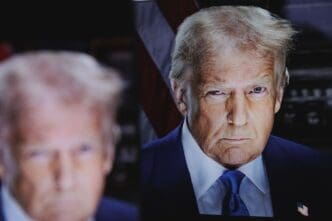President Trump is poised to issue an executive order to suspend the enforcement of a long-standing law aimed at curbing bribery by American and foreign companies.
The executive order, expected to be signed by President Donald Trump, will direct the Department of Justice to temporarily cease enforcing the Foreign Corrupt Practices Act (FCPA), a law established nearly fifty years ago. This act prohibits American entities, as well as foreign companies, from offering bribes to foreign government officials to secure or maintain business opportunities. The decision to pause enforcement aims to prevent U.S. businesses from facing disadvantages against international competitors.
Bloomberg first reported the pending executive order, which includes instructions for Attorney General Pam Bondi to halt current FCPA activities and review past measures associated with the statute. This review is intended to develop new enforcement guidelines. According to a White House official, the enforcement pause will help to streamline the FCPA in line with economic and national security interests.
Originally enacted in 1977, the FCPA serves to deter American firms from engaging in bribery, a practice that exacerbates public corruption and undermines legal systems globally. Over the years, the law has become fundamental to the principles guiding American business operations abroad. Amendments in 1998 extended its reach to foreign companies and individuals instigating bribery within U.S. borders.
The FCPA’s scope covers not only direct payments but also any offer, plan, or authorization of bribes, making the act one of the most comprehensive anti-corruption laws worldwide. Individuals and corporations found guilty of violating the FCPA can face severe penalties, including up to 15 years in prison and a maximum fine of $250,000, or thrice the value of the bribe involved.
In the previous year, the Department of Justice reported enforcement actions in 24 FCPA-related cases, following 17 cases announced in the year before. The breadth of these cases underscores the significant role the FCPA plays in maintaining fair competition and ethical business practices globally.
The implications of suspending FCPA enforcement are profound. On one hand, it may provide relief to certain U.S. businesses under competitive pressure. On the other, it could lead to increased scrutiny and criticism from those who advocate for stringent anti-corruption measures.
While this move to pause is positioned as economically strategic, it raises questions about America’s commitment to combating international corruption and maintaining its role as a global leader in ethical business practices.
The decision to halt the enforcement of the FCPA signifies a substantial policy shift with complex ramifications for international business ethics and American economic interests.








